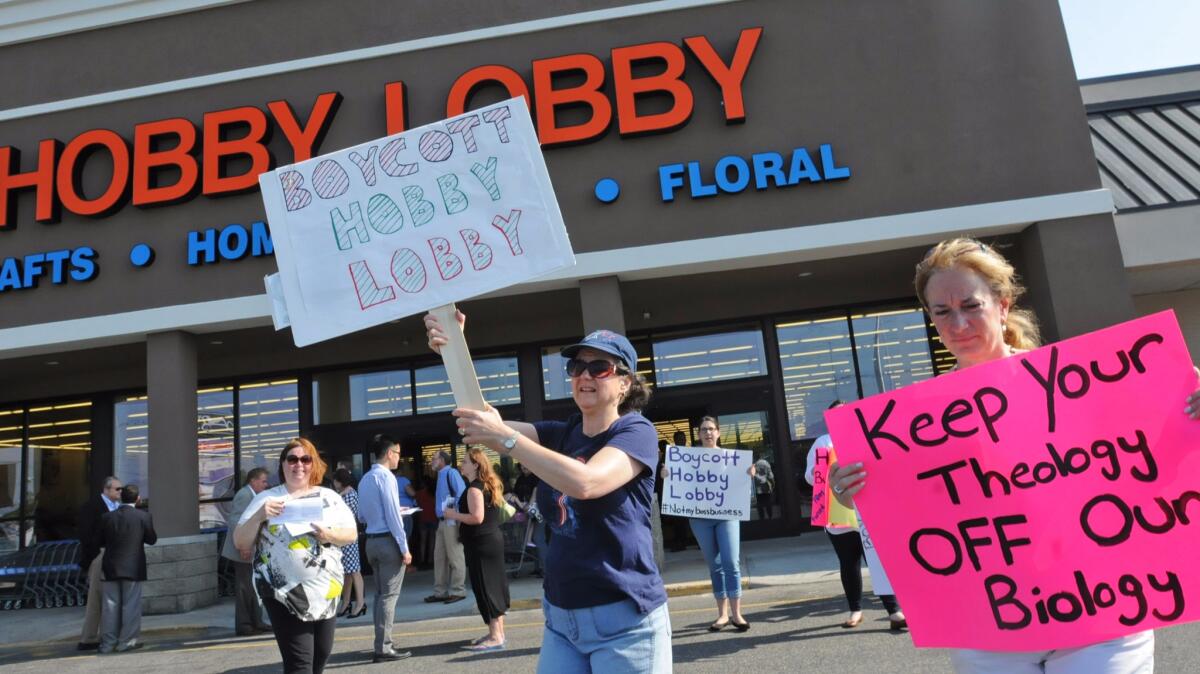Editorial: Mend, don’t end, a religious-freedom law

- Share via
More than two decades ago, Democrats and Republicans united around a bill designed to provide an extra measure of protection for Americans whose religious beliefs made it difficult for them to comply with some laws.
The 1993 Religious Freedom Restoration Act (or RFRA) says that a person may be exempted from laws that “substantially burden” the free exercise of religion. The government can compel compliance only if the law furthers a “compelling governmental interest” and is the “least restrictive means” of furthering that interest. The law was passed in response to a Supreme Court ruling that the 1st Amendment didn’t protect two members of the Native American Church who were fired from their jobs for using peyote, an illegal hallucinogen, in a religious rite.
In signing the bill, then-President Bill Clinton said that it established the principle that “the government should be held to a very high level of proof before it interferes with someone’s free exercise of religion. This judgment is shared by the people of the United States as well as by the Congress.”
But the consensus Clinton referred to has come apart, to the point that some former supporters of the law now think it should be repealed while others are proposing that it be amended to make it clear that it can’t be used to excuse discrimination against others.
What happened to undermine support for a bill that passed the Senate by a 97-3 vote and was approved by a voice vote in the House?
One factor is the overly broad way the Supreme Court interpreted RFRA in its 2014 Hobby Lobby decision. By a 5-4 vote, the justices held that a family-owned for-profit corporation was a “person” under RFRA and could use the law to object to including contraceptives for female employees as part of its company health insurance — despite the fact that such coverage is mandated under the Affordable Care Act.
Justices who dissented from that decision also raised the possibility that RFRA might be used to justify discrimination, despite an insistence by Justice Samuel A. Alito Jr., the author of the majority opinion, that racial discrimination couldn’t be “cloaked as religious practice.”
Congress ... should rectify the error the Supreme Court committed in the Hobby Lobby case when it ruled that for-profit corporations are “persons” under RFRA.
The second development that has undermined support for RFRA isn’t a Supreme Court decision but the reaction to one.
After the court ruled last year that the Constitution required same-sex couples be given marriage licenses, legislators in various states sought to enact state versions of RFRA so that merchants with religious objections to gay marriage could seek to be excused from providing services to same-sex couples — such as a baker who believed baking a wedding cake for two men would violate his religious rights. Some progressives who had previously defended protections for religious beliefs developed second thoughts when it seemed possible that religion-freedom laws could be used as a cudgel against gays and lesbians.
We continue to believe that RFRA and a similar federal law protecting religious freedom in prisons serve a legitimate purpose. The beneficiaries of those laws have included a Muslim prisoner who successfully challenged a rule preventing him from growing a beard; a Native American who sued to force the federal government to return ceremonial eagle feathers it had confiscated; and a Sikh employee of the Internal Revenue Service who was sent home for carrying a kirpan, a ceremonial blade emblematic of her faith that posed no danger to her co-workers.
But in those cases, accommodating the religious scruples of one person didn’t intrude on the civil rights of others. Those who want to amend RFRA insist that Congress should make it crystal clear that the law can’t be used to justify discrimination, including discrimination on the basis of sexual orientation. We agree.
Rep. Joseph Kennedy III (D-Mass.) has introduced the Do No Harm Act, which would clarify that RFRA couldn’t be used to impose the religious views of one person on another or to exempt a believer from compliance with federal civil rights laws. Another bill, the Equality Act sponsored by Rep. David Cicilline (D-R.I.), is primarily designed to expand current civil rights laws to cover discrimination on the basis of sexual orientation or gender identity, a long-overdue expansion of civil-rights law, BUT THE Cicilline bill also says that RFRA can’t provide a defense for acts of discrimination in violation of all civil rights laws.
That should be the principal focus of any effort to amend RFRA. But Congress also should rectify the error the Supreme Court committed in the Hobby Lobby case when it ruled that for-profit corporations are “persons” under RFRA. A revised RFRA would protect the free exercise of religion by individuals — but not at the expense of the rights of other individuals.
Follow the Opinion section on Twitter @latimesopinion and Facebook
A cure for the common opinion
Get thought-provoking perspectives with our weekly newsletter.
You may occasionally receive promotional content from the Los Angeles Times.



